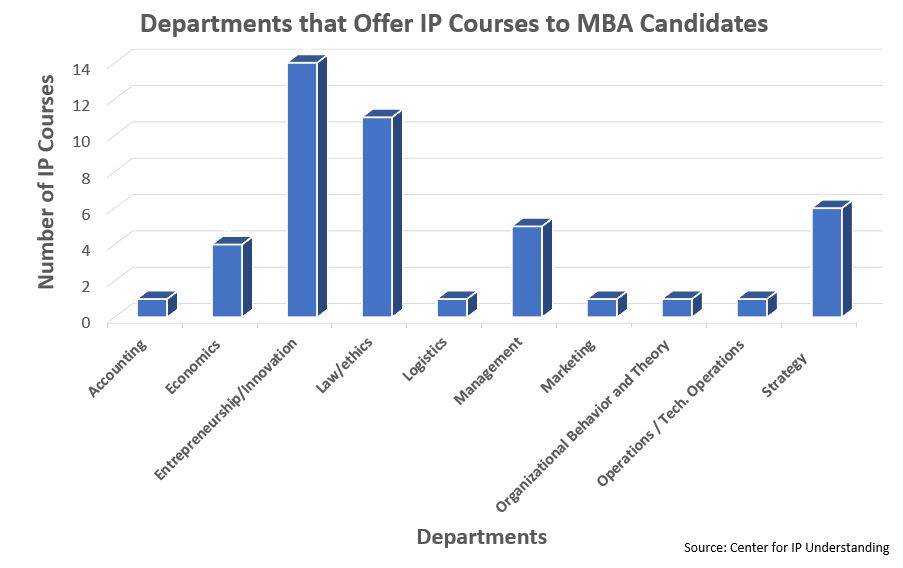Despite the addition of intellectual property courses to the curriculum at most MBA programs, many graduates are not exposed to content about IP value or strategy.
 Students at prestigious universities in the United States are not required to take even a single intellectual property (IP) course to fulfill the requirements for a graduate business degree. Course offerings in 2021 remain elective at all of the elite management programs, and the coverage varies by school, department offering them and the background of the instructor.
Students at prestigious universities in the United States are not required to take even a single intellectual property (IP) course to fulfill the requirements for a graduate business degree. Course offerings in 2021 remain elective at all of the elite management programs, and the coverage varies by school, department offering them and the background of the instructor.
These and other findings about IP education at business schools are contained in a report compiled by the Center for Intellectual Property Understanding (CIPU) that will be announced on Thursday at the 4th Intellectual Property Awareness Summit. The report, “Intellectual Property at Business Schools: An Evolving Landscape,” looks at the state of IP education at the top 20 U.S. programs, as ranked by U.S. News and World Report, and comes away with decidedly mixed findings. While some 44 courses are offered by the leading programs, almost one-third offer a single elective course, and none are compulsory. This is particularly pertinent on World IP Day, the theme of which this year focuses on the importance of IP rights for small and medium businesses, and the problems that a lack of IP understanding can lead to.
Intellectual Property at Business Schools suggests that most B-schools are rising to the IP literacy challenge with more course offerings but are not committed to making IP content a part of their core curriculum. With the amount and value of IP and IP rights continuing to rise – comprising 85% or more of the S&P 500 market value – there is reason to question the ability of business executives who graduate from these programs to effectively manage intangible assets, like patents and trade secrets, as well as trademarks and copyrights.

In addition to gathering data from the top 20 schools, the author of the report conducted a dozen interviews with IP educators from schools including Stanford, Harvard, UC Berkeley, Wharton and Northwestern’s Kellogg School of Management, some of whom provide direct quotes.
Lack of Transparency
“There exists a cultural divide among those proficient in one of the pillars of IP: law, science, design, and business,” states the report. “IP transcends legal frameworks and permeates many classic business school descriptions.”
Harvard Business School and Wharton at the University of Pennsylvania are among top management programs with expanded IP course offerings, six and five respectively. Columbia and Cornell programs do not appear to offer regular instruction, although they have made IP-related courses available on an ad-hoc basis. Most IP courses are taught by instructors in one of 10 departments. Entrepreneurship and Innovation departments lead among those, with 14; Law & Ethics departments offer 10 courses.

“’Intellectual Property at Business Schools’ is the first research to explore the diversity of faculty perspectives and academic departments engaged in educating future business leaders,” said James G. Conley, Clinical Professor of Innovation and Entrepreneurship at the Kellogg School of Management and a member of the National Academy of Inventors. “The findings provide an excellent springboard for greater collaboration, as well as the impetus to build more robust IP course content throughout the university.”
Among key findings of “Intellectual Property at Business Schools; An Evolving Landscape”:
- The top 20 business schools offer a total of at least 44 IP courses
- Almost one-third of business schools offer only one course
- None have a required or core IP course
- Lack of data, especially on soft IP assets such as copyrights and trade secrets, make it difficult for programs to support the IP education argument
- Some B-school educators do not believe that IP is best taught by lawyers
IP Literacy
There is growing support for compulsory course content for all university students that provides a basic understanding of intellectual property, regardless of interest or major. For business students today, many of whom will be managing and financing global businesses that rely significantly on intangible assets like IP rights for success, a working knowledge of how IP influences performance is a basic competency they literally cannot manage without.
Other findings include:
- Interest from faculty is a major factor in whether an IP course will be offered
- The significant and increasing value of IP among businesses presents business schools with a unique opportunity for their students they are not taking advantage of
- Most management programs are rising to the IP literacy challenge but in different ways
- Curricula vary by program, department providing the course and instructor
- Most IP courses are taught by instructors in one of 10 departments
IP Watchdog readers can get the 18-page report here.
The source of the report, the Center for Intellectual Property Understanding (CIPU), is an independent, non-profit organization that raises awareness about creations of the mind, including inventions, designs and authored works, and their impact on people and business. CIPU engages in outreach within an educational framework that seeks to improve IP literacy, promote freedom of ideas and deter infringement.
IPAS 2021, April 28th-29th, is open to the public. The registration fee is being waived this year because of the pandemic. Space is limited.

![[IPWatchdog Logo]](https://ipwatchdog.com/wp-content/themes/IPWatchdog%20-%202023/assets/images/temp/logo-small@2x.png)

![[Advertisement]](https://ipwatchdog.com/wp-content/uploads/2024/03/IP-Copilot-Apr-16-2024-sidebar-700x500-scaled-1.jpeg)
![[Advertisement]](https://ipwatchdog.com/wp-content/uploads/2024/04/Patent-Litigation-Masters-2024-sidebar-early-bird-ends-Apr-21-last-chance-700x500-1.jpg)

![[Advertisement]](https://ipwatchdog.com/wp-content/uploads/2021/12/WEBINAR-336-x-280-px.png)
![[Advertisement]](https://ipwatchdog.com/wp-content/uploads/2021/12/2021-Patent-Practice-on-Demand-recorded-Feb-2021-336-x-280.jpg)
![[Advertisement]](https://ipwatchdog.com/wp-content/uploads/2021/12/Ad-4-The-Invent-Patent-System™.png)







Join the Discussion
5 comments so far.
Night Writer
April 27, 2021 12:11 pmI’ve been to MBA school as well as law school and engineering schools.
Let’s put this properly in perspective. People go to get MBAs to get different types of jobs where there are specializations. Most of the people want management position, line or marketing, in large corporations or in money management.
The ones that want to work in small corporations or start their own corporations take start-up type of classes that are more hands on with legal issues and include IP.
But–this articles leave that out and also separates IP from legal issues where the reality is that most of the legal issues that a business person faces are left out of business school as well.
Maybe ask how many courses are taught on the differences in the types of corporations? Taxation?
Pro Say
April 26, 2021 07:21 pmThanks Bruce — yet another important post.
The fact is that a business degree without anything less than a full year of full (all types) IP coursework . . . is a crippled business degree.
Indeed, in this day and age, one semester’s worth should be compulsory regardless of type of degree.
Plus; such a requirement would be sure to bring in more folks from all walks of life to the IP field.
Such opportunities cannot be seen through closed eyes.
George
April 26, 2021 05:36 pmGuess that means IP is no longer worth much (economically). Pretty sad, eh? Can still be the subject of movies though, especially about famous inventors who got screwed (which we soon won’t have anymore). Inventing will just be another thing done by large corporations and monopolies and just like farming has become! But, hey, maybe you could still make a NFT out of that patent you just got, if nothing else! Wouldn’t even have to be a ‘valid patent’ to do it. LOL!
ipguy
April 26, 2021 05:29 pmMaybe they’ll also teach something about the process by which IP protection is obtained so they will have a realistic idea of, for example, how long and how much it costs to prosecute a patent application.
Anon
April 26, 2021 12:51 pmAs stunning as that may be, it is also a reflection on the Supreme Court (and many others) that do not recognize that innovation IN business itself may well EASILY be viewed as the stuff of Useful Arts.